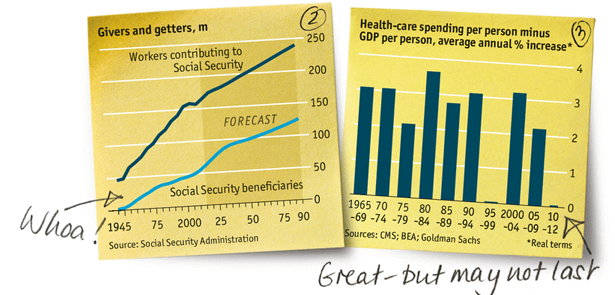The Economist on Entitlement Reform
Notwithstanding the recent short-term progress in reducing the deficit, our long-term debt outlook remains a problem. Although additional revenue will be needed, long-term success in making the debt sustainable will hinge on the ability of policymakers to slow the growth of entitlement spending. In the May 25th edition of The Economist, the magazine puts forward a "briefing" to President Obama on the financial sustainability of entitlement programs and the need for reform.
The federal government clearly has a long-term debt problem, and The Economist argues that the problem is unlikely to be solved without reforming our entitlement programs, due to the pressures of an aging population and rising health care costs.
You declared from your first days in office that Social Security and Medicare have to be fixed. We must not, you said, leave American children a “debt they cannot pay”. But how? You got the rich to pay more taxes, and you rightly want them to pay a bit more. But you have never asked for tax rises on a scale that would finance this sort of growth in entitlements, and for good reason: neither Congress nor the voters would tolerate them for a minute.
The solution will need to be a "grand bargain," argues The Economist, as a bipartisan effort will be needed to produce a plan that has a chance of staying in effect.

Source: The Economist
To get there, The Economist lays out a few principles for entitlement reform, similar to the principles of bipartisan plans like Simpson-Bowles and Domenici-Rivlin:
- No steep cuts in the next five years. The recovery is fragile enough as it is. And you can’t spring big changes on people who are about to retire.
- Any reforms should boost the economy’s supply side. Millions of working-age Americans have left the labour force, sapping the country’s economic potential. Most have quit because they cannot find jobs; but too many entitlements give them an incentive to leave.
- The rich should bear the lion’s share of the adjustment, simply because their incomes have grown so much faster than the average in recent decades.
- Don’t be deterred by the political difficulty. Democrats don’t want to touch benefits, and the only thing Republicans hate more than higher taxes is Obamacare. But action is necessary.
Of course, while guiding principles are a start, the entitlement reform effort will not move far without effective policies. Fortunately, The Economist goes on to describe many specific policies to reform Social Security, disability insurance, Medicaid, and Medicare. It also explores the idea of premium support, strengthening the Independent Payment Advisory Board (IPAB), and other reforms to make the health care system as a whole more efficient. The Economist doesn't list all of possible options available to lawmakers, but many of the options they propose have been featured in bipartisan plans and should at the very least be on the table for consideration.
Overall, The Economist thoroughly describes one of the great challenges lawmakers will face in a comprehensive debt deal, reforming our entitlement programs. These reforms, along with revenue-raising tax reform and other spending cuts, will be needed if we are to put debt on a truly sustainable, downward path as a share of the economy.
Click here to read the full article.

